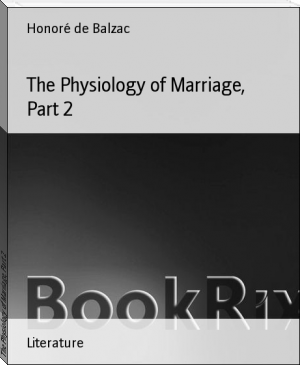The Physiology of Marriage, Part 1 - Honoré de Balzac (english novels to improve english .txt) 📗

- Author: Honoré de Balzac
Book online «The Physiology of Marriage, Part 1 - Honoré de Balzac (english novels to improve english .txt) 📗». Author Honoré de Balzac
But would you learn the truth? Open your Rousseau; for there is not a single question of public morals whose trend he has not pointed out in advance. Read:
"Among people of fixed principles the girls are careless, the women severe; the contrary is the case among people of no principle."
To admit the truth enshrined in this profound and truthful remark is to conclude, that there would be fewer unhappy marriages if men wedded their mistresses. The education of girls requires, therefore, important modifications in France. Up to this time French laws and French manners instituted to distinguish between a misdemeanor and a crime, have encouraged crime. In reality the fault committed by a young girl is scarcely ever a misdemeanor, if you compare it with that committed by the married woman. Is there any comparison between the danger of giving liberty to girls and that of allowing it to wives? The idea of taking a young girl on trial makes more serious men think than fools laugh. The manners of Germany, of Switzerland, of England and of the United States give to young ladies such rights as in France would be considered the subversion of all morality; and yet it is certain that in these countries there are fewer unhappy marriages than in France.
LV. "Before a woman gives herself entirely up to her lover, she ought to consider well what his love has to offer her. The gift of her esteem and confidence should necessarily precede that of her heart."
Sparkling with truth as they are, these lines probably filled with light the dungeon, in the depths of which Mirabeau wrote them; and the keen observation which they bear witness to, although prompted by the most stormy of his passions, has none the less influence even now in solving the social problem on which we are engaged. In fact, a marriage sealed under the auspices of the religious scrutiny which assumes the existence of love, and subjected to the atmosphere of that disenchantment which follows on possession, ought naturally to be the most firmly-welded of all human unions.
A woman then ought never to reproach her husband for the legal right, in virtue of which she belongs to him. She ought not to find in this compulsory submission any excuse for yielding to a lover, because some time after her marriage she has discovered in her own heart a traitor whose sophisms seduce her by asking twenty times an hour, "Wherefore, since she has been given against her will to a man whom she does not love, should she not give herself, of her own free-will, to a man whom she does love." A woman is not to be tolerated in her complaints concerning faults inseparable from human nature. She has, in advance, made trial of the tyranny which they exercise, and taken sides with the caprices which they exhibit.
A great many young girls are likely to be disappointed in their hopes of love!--But will it not be an immense advantage to them to have escaped being made the companions of men whom they would have had the right to despise?
Certain alarmists will exclaim that such an alteration in our manners would bring about a public dissoluteness which would be frightful; that the laws, and the customs which prompt the laws, could not after all authorize scandal and immorality; and if certain unavoidable abuses do exist, at least society ought not to sanction them.
It is easy to say, in reply, first of all, that the proposed system tends to prevent those abuses which have been hitherto regarded as incapable of prevention; but, the calculations of our statistics, inexact as they are, have invariably pointed out a widely prevailing social sore, and our moralists may, therefore, be accused of preferring the greater to the lesser evil, the violation of the principle on which society is constituted, to the granting of a certain liberty to girls; and dissoluteness in mothers of families, such as poisons the springs of public education and brings unhappiness upon at least four persons, to dissoluteness in a young girl, which only affects herself or at the most a child besides. Let the virtue of ten virgins be lost rather than forfeit this sanctity of morals, that crown of honor with which the mother of a family should be invested! In the picture presented by a young girl abandoned by her betrayer, there is something imposing, something indescribably sacred; here we see oaths violated, holy confidences betrayed, and on the ruins of a too facile virtue innocence sits in tears, doubting everything, because compelled to doubt the love of a father for his child. The unfortunate girl is still innocent; she may yet become a faithful wife, a tender mother, and, if the past is mantled in clouds, the future is blue as the clear sky. Shall we not find these tender tints in the gloomy pictures of loves which violate the marriage law? In the one, the woman is the victim, in the other, she is a criminal. What hope is there for the unfaithful wife? If God pardons the fault, the most exemplary life cannot efface, here below, its living consequences. If James I was the son of Rizzio, the crime of Mary lasted as long as did her mournful though royal house, and the fall of the Stuarts was the justice of God.
But in good faith, would the emancipation of girls set free such a host of dangers?
It is very easy to accuse a young person for suffering herself to be deceived, in the desire to escape, at any price, from the condition of girlhood; but such an accusation is only just in the present condition of our manners. At the present day, a young person knows nothing about seduction and its snares, she relies altogether upon her weakness, and mingling with this reliance the convenient maxims of the fashionable world, she takes as her guide while under the control of those desires which everything conspires to excite, her own deluding fancies, which prove a guide all the more treacherous, because a young girl rarely ever confides to another the secret thoughts of her first love.
If she were free, an education free from prejudices would arm her against the love of the first comer. She would, like any one else, be very much better able to meet dangers of which she knew, than perils whose extent had been concealed from her. And, moreover, is it necessary for a girl to be any the less under the watchful eye of her mother, because she is mistress of her own actions? Are we to count as nothing the modesty and the fears which nature has made so powerful in the soul of a young girl, for the very purpose of preserving her from the misfortune of submitting to a man who does not love her? Again, what girl is there so thoughtless as not to discern, that the most immoral man wishes his wife to be a woman of principle, as masters desire their servants to be perfect; and that, therefore, her virtue is the richest and the most advantageous of all possessions?
After all, what is the question before us? For what do you think we are stipulating? We are making a claim for five or six hundred thousand maidens, protected by their instinctive timidity, and by the high price at which they rate themselves; they understand how to defend themselves, just as well as they know how to sell themselves. The eighteen millions of human beings, whom we have excepted from this consideration, almost invariably contract marriages in accordance with the system which we are trying to make paramount in our system of manners; and as to the intermediary classes by which we poor bimana are separated from the men of privilege who march at the head of a nation, the number of castaway children which these classes, although in tolerably easy circumstances, consign to misery, goes on increasing since the peace, if we may believe M. Benoiston de Chateauneuf, one of the most courageous of those savants who have devoted themselves to the arid yet useful study of statistics. We may guess how deep-seated is the social hurt, for which we propound a remedy, if we reckon the number of natural children which statistics reveal, and the number of illicit adventures whose evidence in high society we are forced to suspect. But it is difficult here to make quite plain all the advantages which would result from the emancipation of young girls. When we come to observe the circumstances which attend a marriage, such as our present manners approve of, judicious minds must appreciate the value of that system of education and liberty, which we demand for young girls, in the name of reason and nature. The prejudice which we in France entertain in favor of the virginity of brides is the most silly of all those which still survive among us. The Orientals take their brides without distressing themselves about the past and lock them up in order to be more certain about the future; the French put their daughters into a sort of seraglio defended by their mothers, by prejudice, and by religious ideas, and give the most complete liberty to their wives, thus showing themselves much more solicitous about a woman's past than about her future. The point we are aiming at is to bring about a reversal of our system of manners. If we did so we should end, perhaps, by giving to faithful married life all the flavor and the piquancy which women of to-day find in acts of infidelity.
But this discussion would take us far from our subject, if it led us to examine, in all its details, the vast improvement in morals which doubtless will distinguish twentieth century France; for morals are reformed only very gradually! Is it not necessary, in order to produce the slightest change, that the most daring dreams of the past century become the most trite ideas of the present one? We have touched upon this question merely in a trifling mood, for the purposes of showing that we are not blind to its importance, and of bequeathing also to posterity the outline of a work, which they may complete. To speak more accurately there is a third work to be composed; the first concerns courtesans, while the second is the physiology of pleasure!
"When there are ten of us, we cross ourselves."
In the present state of our morals and of our imperfect civilization, a problem crops up which for the moment is insoluble, and which renders superfluous all discussion on the art of choosing a wife; we commend it, as we have done all the others, to the meditation of philosophers.
PROBLEM.
It has not yet been decided whether a wife is forced into infidelity by the impossibility of obtaining any change, or by the liberty which is allowed her in this connection.
Moreover, as in this work we pitch upon a man at the moment that he is newly married, we declare that if he has found a wife of sanguine temperament, of vivid imagination, of a nervous constitution or of an indolent character, his situation cannot fail to be extremely serious.
A man would find himself in a position of danger even more critical if his wife drank nothing but water [see the Meditation entitled _Conjugal Hygiene_]; but if she had some talent for singing, or if she were disposed to take cold easily, he should tremble all the time; for it must be remembered that women who





Comments (0)